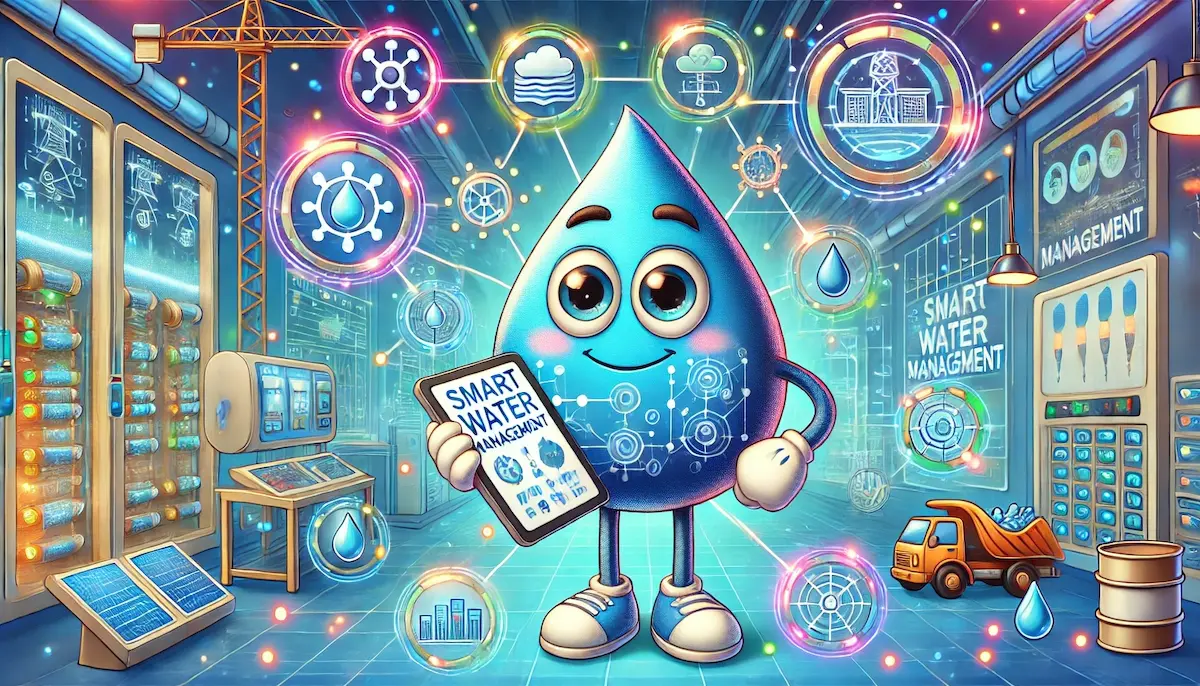Smart water management refers to the use of advanced technologies and data-driven approaches to optimize the use, distribution, and conservation of water resources. This modern approach aims to improve efficiency, reduce waste, and ensure the sustainable management of water systems to meet the growing demand for clean water.
What is Smart Water Management?
Smart water management integrates various technologies, such as Internet of Things (IoT) sensors, data analytics, artificial intelligence (AI), and automated control systems, to monitor and manage water resources in real-time. This approach enhances the ability to detect leaks, monitor water quality, manage water distribution networks, and predict demand, leading to more effective and sustainable water use.
Key Components of Smart Water Management
IoT Sensors and Devices
IoT sensors and devices play a crucial role in smart water management by providing real-time data on various parameters, including water flow, pressure, quality, and consumption. These sensors are installed in water distribution networks, reservoirs, treatment plants, and even individual households.
- Flow Meters: Measure the rate of water flow in pipelines, helping detect leaks and optimize distribution.
- Pressure Sensors: Monitor water pressure to prevent pipe bursts and ensure efficient water delivery.
- Water Quality Sensors: Measure parameters such as pH, turbidity, temperature, and contaminant levels to ensure safe and clean water.
- Smart Meters: Provide detailed data on water usage at the household or business level, enabling better demand management and billing accuracy.
Data Analytics and AI
Data analytics and AI are used to process and analyze the vast amounts of data collected by IoT sensors. These technologies help identify patterns, predict future water demand, and optimize water distribution and treatment processes.
- Predictive Analytics: Uses historical data and machine learning algorithms to forecast water demand, detect anomalies, and predict equipment failures.
- Optimization Algorithms: Optimize water distribution by balancing supply and demand, reducing energy consumption, and minimizing water loss.
- Real-Time Analytics: Provide instant insights into water system performance, enabling quick responses to issues such as leaks, contamination, or equipment malfunctions.
Automated Control Systems
Automated control systems use data from sensors and analytics to manage water systems efficiently. These systems can adjust water flow, pressure, and treatment processes in real-time to ensure optimal performance.
- Supervisory Control and Data Acquisition (SCADA) Systems: Centralized systems that monitor and control water treatment plants, distribution networks, and other infrastructure.
- Remote Control Valves: Automatically adjust water flow and pressure based on real-time data, reducing the need for manual intervention.
- Smart Irrigation Systems: Use weather data, soil moisture sensors, and plant water needs to optimize irrigation schedules, reducing water waste in agriculture.
Geographic Information Systems (GIS)
GIS technology helps visualize and analyze spatial data related to water resources. It supports the mapping of water distribution networks, identification of leak-prone areas, and planning of infrastructure projects.
- Water Network Mapping: Provides detailed maps of water distribution systems, helping identify issues and plan maintenance.
- Spatial Analysis: Analyzes geographic data to identify patterns and trends in water usage, quality, and infrastructure performance.
- Resource Planning: Supports the planning and management of water resources by providing insights into watershed health, land use, and environmental impacts.
Benefits of Smart Water Management
Improved Efficiency
Smart water management enhances the efficiency of water distribution and use by optimizing processes and reducing waste. Real-time monitoring and control enable quick detection and resolution of issues, minimizing water loss and improving service delivery.
Water Conservation
By accurately measuring and managing water use, smart water management helps conserve this vital resource. Technologies like smart irrigation and leak detection reduce unnecessary water consumption and ensure sustainable use of water supplies.
Enhanced Water Quality
Continuous monitoring of water quality ensures that contaminants are detected and addressed promptly. This helps maintain safe drinking water standards and protects public health.
Cost Savings
Improved efficiency and reduced water loss translate into cost savings for utilities and consumers. Smart water management can lower operational costs, reduce energy consumption, and minimize the need for costly infrastructure repairs and upgrades.
Environmental Protection
Smart water management supports environmental sustainability by promoting efficient water use, reducing pollution, and protecting ecosystems. It helps manage water resources in a way that minimizes negative environmental impacts and supports the long-term health of natural systems.
Challenges and Future Outlook
Despite its many benefits, smart water management faces challenges such as high initial costs, the need for advanced technical expertise, and data privacy concerns. Additionally, the integration of new technologies into existing water infrastructure can be complex and time-consuming.
However, the future of smart water management looks promising as technological advancements and increasing awareness of water issues drive innovation and adoption. Continued investment in research, infrastructure, and education will be crucial for overcoming challenges and realizing the full potential of smart water management.
As global water demand continues to rise and climate change impacts become more pronounced, smart water management will play a vital role in ensuring the sustainable and efficient use of water resources for generations to come.
Blockfine thanks you for reading and hopes you found this article helpful.
